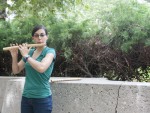In some ways, the whistling, chanting and atonal flute melodies that pervade the Ecuadorian village of Kotama sound like tangled webs of rhythm that are difficult to understand.
But for Jessie Vallejo, the ritualistic rhythms and sounds were the beginnings of a journey to revive an ancient musical tradition and way of life.
The night Vallejo arrived in Kotama in 2010 to research violin performance in northern Ecuadorian music for her doctoral dissertation, she heard the dissonant sounds of indigenous Ecuadorian Kichwa flute music for the first time and immediately changed her topic.
“I had never heard that type of music before,” Vallejo said. “I guess you can say that it changed my life.”
Vallejo, a doctoral student in UCLA’s Department of Ethnomusicology, is currently writing her dissertation on gender, time, space and the transmission of the transverse flute tradition. She co-produced a CD released on July 2, titled “¡Así Kotama! The Flutes of Otavalo, Ecuador,” in conjunction with the Smithsonian Institution, that features indigenous Kichwa musicians performing the songs of a vanishing musical genre.
Trained in violin performance as a child, Vallejo received her bachelor’s degree in music education from the State University of New York at Potsdam.
Vallejo then joined Mariachi de UCLAtlán, an on-campus mariachi group, as a violinist while attending UCLA for her ethnomusicology doctoral studies.
With only basic training in flute performance from her undergraduate education, Vallejo began receiving Kichwa flute lessons from her host family and friends from the small village of Kotama in the municipality of Otavalo, Ecuador.
“The friends I made, the time I spent with them was the best part,” Vallejo said. “It was all centered around music, whether it was the flute or the violin, and having those times to join in on the music was really nice.”
In her research on the flute tradition, Vallejo said she discovered a rich history of the Kichwa language and culture in the Kotama residents and flutists, many of whom were eager to introduce her to Ecuadorian life.
But throughout the years, the Kichwa tradition in northern Ecuador has begun to vanish because of religious conflicts and adoptions of other languages and musical styles, said Luz María De La Torre, a lecturer in the Department of Spanish and Portuguese at UCLA and a member of Ecuador’s indigenous Kichwa population.
However, Vallejo’s work publicizing the Kichwa language, music and culture throughout Ecuador has fostered a sense of pride in the small Kichwa community and helped it rebuild its disintegrating culture, De la Torre said.
“Jessie helped this community to be more proud, more confident about being home to an indigenous people,” De la Torre said. ” We as teachers can only teach what is in the books, but she’s applying everything and giving back to the indigenous community and ultimately improving the community’s welfare.”
In producing the CD, Vallejo discovered the Hatun Kotama Flute School, which strives to preserve the flute tradition that has almost completely disappeared from neighboring towns and villages.
Vallejo said a major challenge in producing the album was adapting the musical style to a CD format, where much of the traditional performance value was lost.
“Even though it’s taking the traditional style out, (the flutists) did their best to bring the performance to the CD,” Vallejo said. “That’s why you hear all the whistling and the talking and the different vocals and the foot-stomping, because it’s hard to put in all those elements (in a CD).”
Logan Clark, a fourth-year ethnomusicology graduate student and a classmate of Vallejo, said Vallejo brings her passion of bridging the gap between American and South American cultures to UCLA by sharing her love of world arts and traditions in on-campus groups.
“Jessie was the leader of (Mariachi de Uclatlán) here and is extremely dedicated to that group,” Clark said. “She’s very humble about her achievements and is doing a lot to further the connection between the cultures.”
Vallejo said a longtime goal of her research is to show a broad audience that being an ethnomusicologist means not only studying music but also developing skills in dealing with people from many different cultures and traditions.
She said she hopes to achieve this with the CD release and the support of friends from Ecuador, family and Smithsonian Folkways, the non-profit recording label of the Smithsonian Institution.
“As an ethnomusicologist, you go out and live the life of the musician so you can observe how music is part of their life,” Vallejo said. “I want to show everyone what type of work I can look forward to in my field.”
